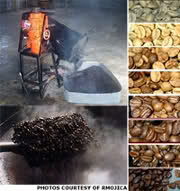 No coffee can be good in the mouth that does not first send a sweet offering of odor to the nostrils. Thus, the famous line of Henry Ward Beecher, which has now found its way in the personalized coffee mugs sold nationwide.
No coffee can be good in the mouth that does not first send a sweet offering of odor to the nostrils. Thus, the famous line of Henry Ward Beecher, which has now found its way in the personalized coffee mugs sold nationwide.
Filipinos love to drink coffee. Drinking coffee is a favorite pastime and an engaging social activity for many of us. The sprouting of various coffee shops in almost every corner of the metro has become the most evident indication that the coffee shop industry is a thriving business.
Our love for coffee was basically brought about by the colonization of the country by the Spaniards more than two centuries ago when they turned our highlands into coffee plantations. They loved the perfect mix of heat, humidity and cold plus the wet and dry tropical climate that made the cultivation of coffee well suited in the Philippines.
Growing coffee became such a profitable venture that for a while, the Philippines was one of the leading coffee-producing nations during the 19th century. But due to the coffee rust disease such reputation was cut short. It was during this time that the Latin American countries battled it out and dominated the global coffee market.
In the Philippines, the coffee plantations are mostly concentrated in the mountains of Batangas, Bukidnon, Benguet, Cavite, Kalinga-Apayao, Davao , Claveria, and Misamis Oriental. Approximately 60,000 – 80,000 families with roughly 120,000 hectares of productive land grow coffee. These lands are both home and production unit for our local coffee growers.
The key to good coffee is bean roasting
In a recent market study conducted by Ronald Mark G. Omaña of the Center for Food and Agri Business University of Asia and the Pacific, he cited “coffee bean roasting formula as the critical factor” among major specialty coffee shop owners in the Philippines as “ it is this stage where the coffee bean releases its fullest flavor potential. Poorly roasted beans would yield poor-tasting coffee drink.”
For coffee connoisseur and self-confessed addicts, the difference always lies in how the coffee was prepared. Before, we were used to drinking instant coffees, simply because they are ubiquitous and are easy to prepare.
But with the emergence of specialty coffee shops both foreign and local brands, even the tongue that was once used to drinking instant coffees are now craving for the “real coffee”—made from coffee beans grown in ideal climates and prepared according to standards, thus the distinct rich taste and flavor.
Before your rich coffee ends in your favorite mug and be enjoyed, it must first undergo several processes, one of which is roasting.
Roasting coffee is the process of applying heat to transform the chemical and physical properties of green coffee beans into roasted coffee products. By applying heat, impurities in the beans are dried off for oxidizing products. This process is integral in producing a savory cup of coffee. Right amount of heat, right timing, in a uniform manner are required to achieve the desired flavor from the beans.
The heat problem in coffee roasting
Coffee shops in the Philippines continue to thrive by the numbers. But most of them are under franchising arrangements with big, foreign companies. These franchising companies can afford expensive roasters and other costly equipment.
With huge processing equipment, an ordinary coffee grower cannot compete with them. There might be a few available coffee roasters for smallscale roasting but they may not turn out as efficient as the expensive ones, resulting to poor quality roasted beans.
Since coffee roasting involves proper heat application, common problems encountered include the uneven distribution of heat inside the roasting chamber and the lack of insulating materials which results to excessive heat loss.
There is, therefore, a need for locally manufactured coffee roaster specifically for smallscale roasting purposes to boost the smallscale coffee growers in the country.
Low cost coffee roaster for smallscale business
Responding to this problem, Engr. Ruel M. Mojica of the Cavite State University (CaVSU) and Dr. Engelbert K. Peralta of the University of the Philippines Los Baños (UPLB) developed the first ever batch-type coffee roaster that can be used for small-scale roasting.
The coffee roaster was designed and fabricated at the College of Engineering and Agro-Industrial Technology in UPLB wherein the machine’s performance was also evaluated. The prototype coffee roaster is made up of six major parts: roasting chamber, outside drum, auger, heating plate, and burner. Parameters used during the evaluation included: auger speed, roasting time, valve opening, and fuel consumption.
Results of the performance evaluation, showed that the machine had varying levels of auger speed. However, the varying speed made no significant effect on all the response variables. They also found an increase in roasting time which decreased the weight and moisture content of the roasted beans.
Varying the levels of valve opening was found to have significant effects on the weight and moisture content of the roasted beans as well as the fuel consumption of the machine. No significant effect was noted on the roasting capacity of the machine.
In terms of sensory evaluation, coffee obtained using treatment combination of 40-rpm auger speed, 60-minute roasting time, and 3/4 open valve obtained the highest coffee rating of 86.1.
In the cost and return analysis, results showed that using this coffee roaster for smallscale custom work can be a profitable business venture with a potential net income of P63, 451.49 annually.
Some innovations
The prototype model of the batch-type coffee roaster was first completed in 2005 but further innovations are being done to further improve the capability of the developed machine.
These are: 1) evaluation of the machine using other coffee varieties (e.g. Arabica, Liberica, etc.); 2) development of a microcontroller-based temperature control unit and software that would control the operation of the machine for a given period of time, 3) evaluation of the machine using other crops (e.g. cacao, peanut) aside from coffee; and 4) use of Response Surface Methodology (RSM) to determine the optimum operating conditions of the machine. end
——-
This article was based on the study, “Development and Evaluation of Batch-type Coffee Roaster for Small-Scale Roasting” by Engr. Ruel M. Mojica of the Cavite State University (CaVSU), Indang, Cavite, Philippines.
For more information, please contact the project leader, Engr. Ruel M. Mojica at the Department of Agricultural and Food Engineering, CaVSU at telephone no. (046) 415-0021 or fax no. (046) 415-0012 or through his mobile number: 09272510497 or e-mail him at ruelmojica@yahoo.com
Article by Rita T. dela Cruz – bar.gov.ph, April-June 2007 Volume 9 Issue No. 2
Do you like this business ideas for entrepreneurs? then please consider subscribing to our PINOY BISNES ![]() RSS feed. You can also subscribe by email and have new business ideas sent directly to your inbox. (Once you entered your e-mail address, you need to login to your e-mail account and click the link to confirm your subscription).
RSS feed. You can also subscribe by email and have new business ideas sent directly to your inbox. (Once you entered your e-mail address, you need to login to your e-mail account and click the link to confirm your subscription).




Dear Sir/Ma’am,
I would like to inquire if you have coffee processing machine.
from bean pulper, huller with sifter, coffee roaster and coffee grinder. Can you send your product catalogue with competitive price discount to my email.
Thank you,
My wife and I are starting a small coffee selling business. Can you please tell me how how can I contact you to purchase one of your coffee roasting machines?
Hi Sir/Ma’am Good Day !
I would like to inquire regarding with your Coffee Roaster if it is still available?
Thank you so much and looking forward to hear from you .
—
Regards ,
Grace Suganob
Sales Coordinator
Universal Commercial Corp.
02-551-7374